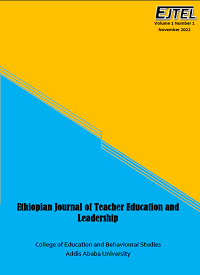Teachers’ Knowledge, Attitude and Practices on Visualization Techniques in the Teaching-Learning of Middle School Science and Mathematics Subjects in Ethiopia
DOI:
https://doi.org/10.20372/ejtel.v1i1.7636Keywords:
Visualization, Teachers’ Knowledge, Teachers Attitude, Teachers Practices, Science and Mathematics Education, Middle SchoolAbstract
This study assessed teachers’ knowledge, attitude and practices of visualization techniques in the teaching-learning of science and mathematics subjects in middle schools in Ethiopia. The study employed survey study design. Quantitative data were collected using a self-report questionnaire from 151 middle school science and mathematics teachers selected from two regional states and one city administration of Ethiopia using cluster sampling method. Qualitative data were also generated using interview in order to augment the quantitative data. Both quantitative and qualitative analyses were used to make meaning of the collected data. Results indicated that science and mathematics teachers’ knowledge, attitude and practices in implementing visualization techniques were below the average or expected value. There was no significant difference in teachers’ knowledge, attitude, and practices of visualization in designing lessons, teaching concepts, exposing students to practice, and assessing students’ progress on visualization techniques with respect to gender, qualification, and subject matter. It was recommended that schools provide the appropriate tools, teachers should be given training on how to implement them, the textbooks and teachers’ handbook should be revised by incorporating the appropriate visualization techniques, and supporting the teachers in the implementation of visualization.

